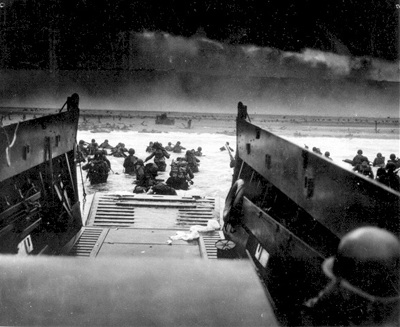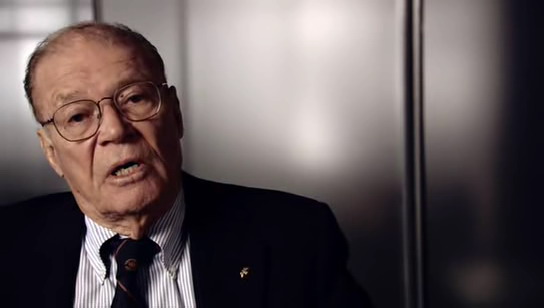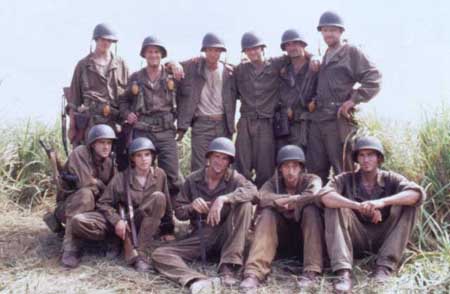“Auschwitz, great…are the Packers playing?” By all that is good and holy, what was Dick Cheney thinking? It’s the 60th anniversary of liberation from that Hell on Earth, and our veep, as the Post wryly put it, “was dressed in the kind of attire one typically wears to operate a snow blower.” Even at occasions where it seems well nigh impossible to make the US role in world affairs look bad, this administration plays the Ugly American to the hilt. For shame.
Category: WWII
The other Japanese Occupation.
Some food for thought for my Asia-Pacific sections today (by way of Prof. Armstrong): Historian John Dower compares the Iraq imbroglio to Japanese expansion in Manchuria. Before rejecting his argument outright, at least consider the source. Dower knows a great deal about America’s experiences in postwar Japan — more, I’d wager, than anybody working in the Dubya administration.
New School.
Another semester begins here at Columbia today, although the class I’m teaching this term — “The Asia-Pacific Wars 1931-1975” with Prof. Charles Armstrong — doesn’t meet until tomorrow. (I had been slated originally for Anders Stephanson‘s “US Foreign Policy” class, but have moved over to this Pacific-Specific class due to the usual overbooking and underbooking issues…so, while I’m missing out on a few books on progressive internationalism that had caught my fancy, the reading list for this new class seems intriguing in its own right.)
June 6, 1944.

“People of Western Europe: A landing was made this morning on the coast of France by troops of the Allied Expeditionary Force. This landing is part of the concerted United Nations’ plan for the liberation of Europe, made in conjunction with our great Russian allies …I call upon all who love freedom to stand with us.” – Dwight Eisenhower
Academy Fight Song.
In a speech before graduates of the Air Force Academy, Dubya compares the war on terror to WWII. And, a day after being called out by Dana Milbank for his straw men, Bush is at it again: “Some who call themselves realists question whether the spread of democracy in the Middle East should be any concern of ours.” Is that really the central argument being made by those dubious of our foray into Iraq? I don’t think so.
Foggy Winter.

If you can stand being bombarded by endless slo-mo shots of dropping ordnance set to a Phillip Glass pulse, The Fog of War, the new Errol Morris documentary about and extended interview with former Secretary of Defense Robert McNamara, makes for an interesting evening out. Despite the heavy saturation on screen, there are no real historical bombshells dropped here — The movie doesn’t aim to muckrake a la The Trials of Henry Kissinger, and the picture you get of Vietnam-era McNamara is the same one you’d find in a book like Robert Schulzinger’s A Time for War: Publicly optimistic, McNamara seems deeply cognizant from early on that Vietnam will be a quagmire, but he — like LBJ and almost all of the foreign policy establishment — are too blinded by the fear of falling dominoes to consider withdrawal as a viable option. (McNamara does add fuel to the fire here that Kennedy wanted a full withdrawal by 1965. I guess if anyone would know, he would, but the books I’ve read don’t really bear this out.)
Nor do we ever seem to get under McNamara’s skin here — he remains intelligent and composed throughout, deflecting the tougher questions about Vietnam with a practiced ease. Still, McNamara, a surprisingly spry 86, does offer us some intriguing (and occasionally self-serving) reminiscences here about his experiences in the corridors of power, from his assessment that the Cuban Missile Crisis was defused mainly by simple, dumb luck to his thoughts on the morality of civilian fire-bombing, which he efficiency-maximized for Curtis LeMay during WWII.
As a documentary, The Fog of War sometimes gets clouded by its own cinematic devices — to take just one example, there’s a shot of dominoes across a map of Asia that is striking at first but fast becomes overused. And the continual Phillip Glass cascading over falling bombs and rushing people had me thinking of Koyaanisqatsi outtakes a lot of the time. In sum, the film works best when it’s simply an engaging monologue by an intelligent, evasive, and often frustrating Cold Warrior as he muses over a life perhaps not-so-well lived.
Consume and Progress.
Another wave of updates over at the Orals site:
| Lizabeth Cohen, Making a New Deal: Industrial Workers in Chicago, 1919-1939. Lizabeth Cohen, A Consumer’s Republic: The Politics of Mass Consumption in Postwar America. Alan Dawley, Struggles for Justice: Social Responsibility and the Liberal State. John Dower, War Without Mercy: Race & Power in the Pacific War. Jackson Lears, Fables of Abundance: A Cultural History of Advertising in America. Daniel Rodgers, Atlantic Crossings: Social Politics in a Progressive Age. Robert Wiebe, The Search for Order, 1877-1920. |
Werewolves of Baghdad.
Slate correspondent Daniel Benjamin pokes holes in Condi and Rummy’s recent spurious comparisons between postwar Iraq and Germany. Yep, it’s more revisionist history emanating from Team Dubya. In related news, Jack Beatty laments Dubya’s lack of postwar vision, which now seems ever more constrained to lining the coffers of Halliburton.
The Thick Red Line.
 Only six years after The Thin Red Line, Terrence Malick readies his fourth film, Che, tentatively with Benicio Del Toro in the title role. (Expect voiceovers.) I just watched TTRL again the other night and was amazed once again how many people are in it. I remembered Jim Caviezel, John Cusack, Woody Harrelson, John Travolta, George Clooney, John C. Reilly, Ben Chaplin, Nick Nolte, Adrien Brody, Sean Penn, and Elias Koteas from the first go-round in the theater. But seeing it again this week, I now also noticed Tim Blake Nelson, Nick Stahl, Jared Leto, Matt Doran (Mouse from The Matrix), and Thomas Jane — plus Miranda Otto as Chaplin’s wayward wife on the homefront. I’d love to see the unreleased six-hour version someday (which, according to the credits, apparently also includes Viggo Mortensen, Mickey Rourke, Lukas Haas, Billy Bob Thornton, Bill Pullman, Jason Patric, Martin Sheen, Donal Logue, Randall Duk Kim [The Keymaker from Reloaded], and a full-on performance by Brody), even if it ends up being too much for one sitting.
Only six years after The Thin Red Line, Terrence Malick readies his fourth film, Che, tentatively with Benicio Del Toro in the title role. (Expect voiceovers.) I just watched TTRL again the other night and was amazed once again how many people are in it. I remembered Jim Caviezel, John Cusack, Woody Harrelson, John Travolta, George Clooney, John C. Reilly, Ben Chaplin, Nick Nolte, Adrien Brody, Sean Penn, and Elias Koteas from the first go-round in the theater. But seeing it again this week, I now also noticed Tim Blake Nelson, Nick Stahl, Jared Leto, Matt Doran (Mouse from The Matrix), and Thomas Jane — plus Miranda Otto as Chaplin’s wayward wife on the homefront. I’d love to see the unreleased six-hour version someday (which, according to the credits, apparently also includes Viggo Mortensen, Mickey Rourke, Lukas Haas, Billy Bob Thornton, Bill Pullman, Jason Patric, Martin Sheen, Donal Logue, Randall Duk Kim [The Keymaker from Reloaded], and a full-on performance by Brody), even if it ends up being too much for one sitting.
Adaptation.
Caught a number of films in the theater and on DVD over the past week, so as per usual, here’s the skinny:
L’Auberge Espagnole: I went into this movie more blind than usual – The only review I had read was George‘s, and for some reason I thought the film was about a mid-life crisis. So I was quite happily surprised by this sweet comedy about assorted European Erasmus students enjoying a Barcelona summer. Like Y Tu Mama Tambien (which I thought was a little overrated but good nonetheless), this movie illustrates yet again just how tame and lame our domestic youth comedies have become. L’Auberge was funnier, sexier, and more intelligent than any of the assorted American Pies or their ilk, and, whatsmore, all of the characters acted and seemed like “real” people. This movie seems to understand that it’s possible to capture the joys of youth and friendship without resorting to a constant stream of lame, mostly unfunny gross-out jokes. Even when L’Auberge founders in cliche (Here’s to you, Mrs. Robinson) or somewhat hamhandedly offers us a life-lesson in the last ten minutes or so, its moralizing still didn’t come off as egregiously as in Old School or Anger Management, to take two recent examples of bad American comedy. In sum, L’Auberge Espagnole is a fluffy film but a fun one nonetheless, and special marks go to Kevin Bishop as the visiting brother/terminal wanker – He more than makes up for the Audrey Tautou factor.
The Hulk: Ok, we may suck at comedies, but there are some things that American film does well, and very few of them are evident in The Hulk. “I’m trying to make a delicacy out of American fast food,” said Ang Lee about this project, and I had high hopes he might make something special out of the green machine. Well, I usually like Ang Lee, and I like the Hulk comics (never cared all that much for the TV show), but sadly, the two together didn’t work at all. Hulk begins with a great credit sequence and then falters for the next hour and a half…in fact, the Hulk himself doesn’t show up until an hour or so into the movie – Instead, we’re forced to sit through long, bad monologues about memory repression and daddy issues that never really amount to all that much. Even when it seems the movie is starting to find its sea legs, when [Significant Spoilers to follow] Hulk escapes into the desert and Nick Nolte (chewing the scenery like Al Pacino gone rabid) surprisingly becomes the Absorbing Man, it turns out to be just an illusion. Instead, we get more improbable conversations about daddy, and the Absorbing Man – one of the Hulk’s classic villains – instead becomes Cthulu the Jellyfish God or something. All in all, Hulk turned out to be long and boring. It’s sad, really, ’cause this film could have been really good. The Hulk looks right, even if his jumping is a bit off (He should come down with the force of a minor earthquake each time, not bounce around like Q-Bert), and I liked the comic book wipes and fades employed throughout the picture. But, in the end, to quote Amadeus, the Hulk suffers from too many notes. They could’ve played up the Frankenstein angle or the Jekyll and Hyde angle, but they don’t have time to do both and layer on all the Freudian repression stuff. Make all the delicacies you want, but in the end Hulk should be big, green, angry, and destroying stuff (He also should be talking, but oh well.) Somewhere along the way, Ang Lee lost focus and became more concerned with making an arthouse “comic-book movie” than with making the Hulk. Particularly given how pitch-perfect X2 turned out, this is a considerable disappointment.
Human Nature: Charlie Kaufmann’s other movie (besides Being John Malkovich, Confessions of a Dangerous Mind, and Adaptation, the last of which seems at least tangentially related to the material of this film) was a holdover from my Blockbuster night earlier in the week. And while there are a number of funny scenes throughout the movie, they sadly don’t add up to being a very funny film. The performances are generally good, particularly Tim Robbins as a repressed, manners-obsessed scientist (who tells his tale from beyond the grave, which was a bit strange since I watched Jacob’s Ladder again only last weekend), Rhys Ifans as “Puff,” the ape man subject of Robbins’ experiments (One of the funnier scenes in the movie involves Ifans trying frantically to hump a slide show screen, despite being continuously shocked by Robbins), and Miranda Otto (a million miles away from Rohan) as Robbins’ coquettish, quasi-French assistant. Sadly, though, there’s a lot of downtime between the jokes, and I lost interest in the movie in the last half hour or so. I’m on the fence on this one, but in the end I guess I wouldn’t recommend it.
The Grey Zone: This film is obviously a 180 degree turn in tone and content from Human Nature, so I’m glad I ended up watching them on different nights. The Grey Zone is a very bleak tale of the 12th Sonderkommando, the group of Jewish prisoners assigned to tend the murdering gas and fires of Auschwitz in 1944. Hard to watch at times, it might even be more unflinching than The Pianist, since it just throws you immediately into the horror without the slow buildup of the Szpilmans. Most of the action of the movie, which began as and still feels like a play, evolves around the plans for a coming uprising, and how they’re thrown into disarray by an unusual event in the gas chamber. If you can stomach it – and can get over the anachronistic accents and Mamet-y dialogue, the Grey Zone is well worth viewing, not the least to experience the surprise of a film in which David Arquette gives a more nuanced and absorbing performance than Harvey Keitel, who reminded me of Kurt Fuller’s impression of Col. Klink in Auto Focus.
